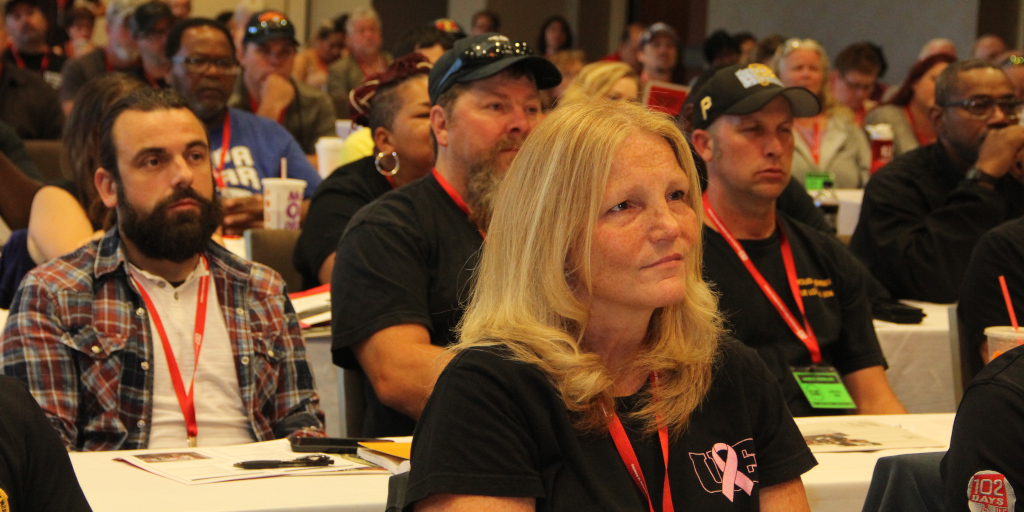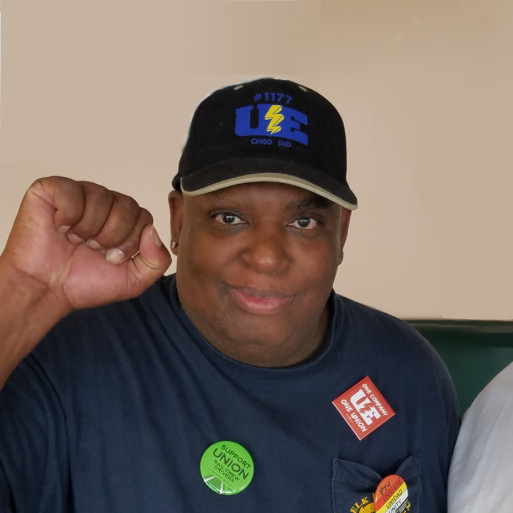
UE local unions are the heart of our democratic structure and commitment to being a member-run union: they are where contracts are negotiated and grievances pursued, where we take the fight to the boss in the workplace.
But it is also important that the larger structures of the union be run by the members. While every single member cannot be involved in every decision made at the regional or national level, UE has developed structures and traditions that involve as many of the union’s members as possible in setting the overall direction of the union, and deciding who leads it.
UE Regions
UE is made up of geographical Regions covering different parts of the United States, as outlined in the constitution. While the number of Regions and their geographic boundaries have changed from time to time (reflecting shifts in union membership and the location of locals), the function of the Regions has not changed since the beginning of our union. UE Regions — officially known as Regional Councils — work with and provide help to locals in each Region, especially in the areas of political action, education and leadership training, organizing the unorganized, and collective bargaining.
The Council itself consists of elected delegates from every local in the Region, meeting twice a year. Each local is encouraged to send their full complement, because here is where members can broaden their role in, and understandings about, UE. It’s at the Regional Council meeting that local members and officers get to know each other, share experiences, and learn new strategies and tactics. Regional Council meetings also provide an important forum for discussing issues facing the National Union in between National Conventions, which are held every two years.
UE National Conventions
The National Convention, held every two years, is the highest decision-making body in UE. It is composed of rank-and-file delegates elected by members of their local unions, plus delegates from each Regional Council.
Each local, and Regional Council, is encouraged to submit policy resolutions for consideration by the delegates. The union’s General Executive Board also submits proposals to the Convention. Following discussion and debate, delegates vote to adopt resolutions. Those that are accepted become the policy of the union.
Delegates vote on any necessary changes to the constitution, which must then be ratified by a majority of all UE locals before they can take effect. They also nominate and elect the UE’s three top officers (officially known as the General Officers).
National and Regional Leaders
Each Region elects officers, an executive board, and trustees at their spring council meetings. The president of each Region is a full-time officer, and serves as a vice-president of the National Union.
The top officers of each region, along with a number of other executive board members chosen at the spring council meetings, serve on the National Union’s General Executive Board (GEB). The GEB meets three times per year and makes decisions for the National Union in between National Conventions. The Region’s trustees also serve as trustees for the National Union, and audit the finances of both levels of the union three times per year.
The National Union’s three top officers, the General President, General Secretary-Treasurer, and Director of Organization, are elected at the National Convention. These General Officers are responsible for overseeing the day-to-day operations of the National Union.
Local delegates at regional council meetings and national conventions elect these regional and national leaders, which is a serious responsibility. Delegates should involve their local memberships in discussions about the issues facing the union before attending regional and national meetings, to help them make informed decisions that are in line with the priorities of their members. It is UE practice that candidates for regional and national office campaign among the locals prior to the council meeting or convention where elections take place, to ensure that the election is about issues and not personalities. Delegates elected to represent their locals should vote at convention based on democratic decisions made by their local membership, not their own personal decisions.

Our conference board works as a direct line of communication between the locals under the Hallcon national contract. The conference board members then share developments with members in the locals.
We have to decide together as the six locals to make decisions that affect all of us. Our conference board helps us when we are bargaining a new contract. We are able to plan together, finding ways to get our members involved in the contract fight.
—Larry Hopkins, President of UE Local 1177 and Chair of the UE Hallcon Conference Board
Conference Boards
In some industries, UE locals need to coordinate with each other on a national level, whether it is to negotiate a national contract with a single employer or address issues affecting their entire industry. To meet this need, UE has established “conference boards,” which bring together delegates from UE locals in a particular company or industry. All conference board decisions are made by elected rank-and-file leaders from the locals.

Members should:
- Read the UE NEWS to follow what is happening elsewhere in the union
- Attend local union meetings to hear reports from delegates to regional council meetings, conference board meetings and national conventions, and participate in discussions about the issues facing the union at the regional and national levels
- Consider running for delegate to regional council meetings and national conventions
Local leaders and delegates to regional council meetings, conference board meetings and national conventions should:
- Solicit thoughts and opinions from members of their locals about issues facing the union to bring to the regional and national level
- Provide opportunities for candidates for regional and national office to make a case to their membership as to why they should be elected
- Make full reports to their local memberships about issues discussed and decisions made at regional and national meetings